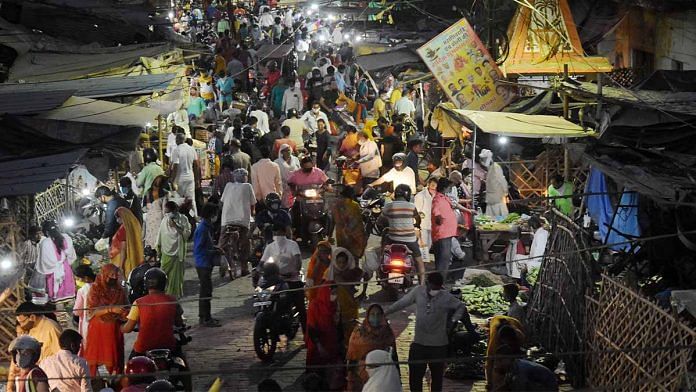
New Delhi: A day after the Allahabad High Court imposed a near-lockdown in five cities in Uttar Pradesh till 26 April, the Supreme Court Tuesday stayed the implementation of the order.
A three-judge bench led by Chief Justice S.A. Bobde held an urgent hearing on an appeal filed by the Yogi Adityanath-led state government in the matter.
Solicitor General Tushar Mehta had mentioned the government’s appeal before the bench commenced the day’s work and requested a hearing on the matter today itself considering the nature of the directions issued by the high court. Mehta said that the HC could not have issued directions that amount to virtual lockdown in the cities.
The Solicitor General said the state shared the court’s concern and had already taken steps enlisted in the directions. “We do not have objections to some of the other measures suggested, but to have a lockdown by a judicial order may not be right,” he submitted.
Mehta added that the state was also ready to enumerate on the steps it has taken to arrest the spread of Covid-19 in Uttar Pradesh before the top court.
Therefore, in its order, the SC bench said: “Mehta states that the state government has issued several directions to contain the spread of the coronavirus and are taking adequate precautions on its own. He further submits that the blanket conditions imposed by the court in five cities in terms of the impugned order would be as rigorous as a lockdown, though the High Court has observed they are nowhere close to a complete lockdown. In these circumstances there shall be interim stay of the High Court judgment.”
While the bench was initially reluctant to keep the matter pending, it agreed to hear it again after two weeks. The Supreme Court also sought a report from the UP government on the steps taken to curb Covid-19 in the state.
Senior advocate P. Narasimha was also appointed as amicus curiae in the matter to assist the court.
Allahabad High Court order
The Allahabad High Court Monday directed the Uttar Pradesh government to shut down all private and government-run establishments in five cities — Prayagraj, Lucknow, Varanasi, Kanpur Nagar and Gorakhpur — a day after the state recorded the highest single-day spike of 30,596 cases Sunday.
“If people die of pandemic in a large number due to paucity of sufficient medical aid it would be the governments to blame which failed to counter the pandemic even after one long year of experience and learning. One would only laugh at us that we have enough to spend on elections and very little to spend on public health,” the HC bench had noted, adding that “it is a shame that while the Government knew of the magnitude of the second wave it never planned things in advance.”
It took a grim view of the pandemic and said the “recent surge of pandemic COVID-19 has virtually incapacitated all our medical infrastructure” and had “exhausted” the frontline medical and healthcare workers, thus making it necessary for the court to take the “harsh measures.”
The court had exempted financial institutions, medical and health services, industrial and scientific establishments, essential services including municipal functions and public transport from the order.
(Edited by Rachel John)
Subscribe to our channels on YouTube & Telegram
Why news media is in crisis & How you can fix it
India needs free, fair, non-hyphenated and questioning journalism even more as it faces multiple crises.
But the news media is in a crisis of its own. There have been brutal layoffs and pay-cuts. The best of journalism is shrinking, yielding to crude prime-time spectacle.
ThePrint has the finest young reporters, columnists and editors working for it. Sustaining journalism of this quality needs smart and thinking people like you to pay for it. Whether you live in India or overseas, you can do it here.